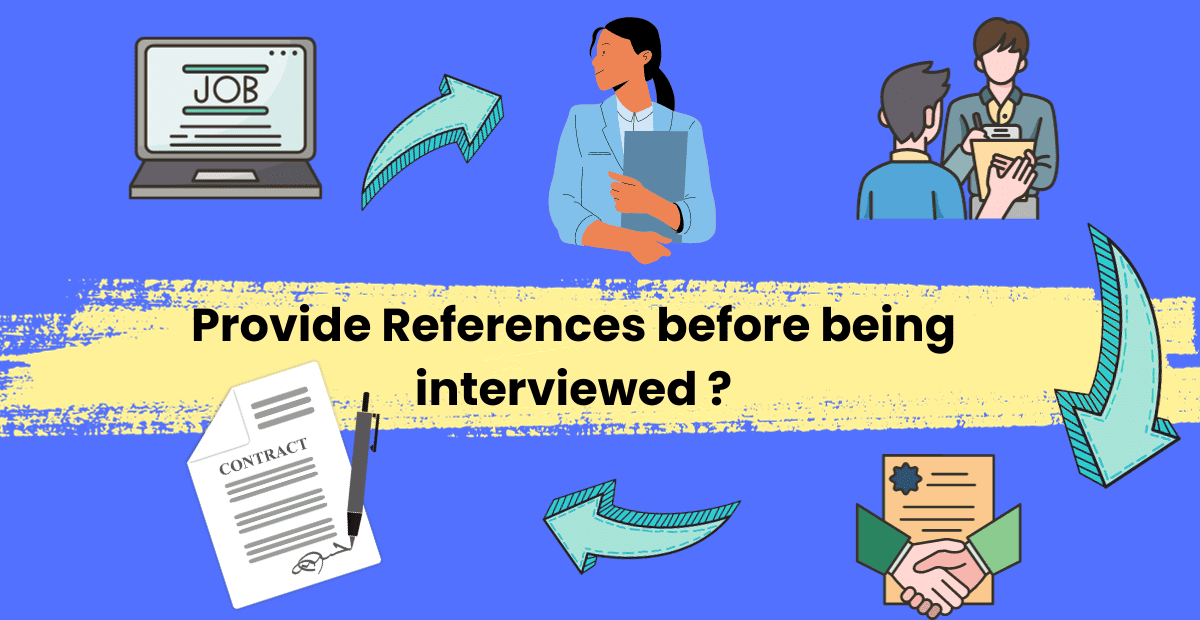Should You Provide References Before Being Interviewed

Table of Contents
Key Takeaway
- Have references ready, but provide them only if explicitly asked before an interview.
- References offer insights into work ethic, skills, and character from a third-party perspective.
- Positive references confirm suitability, while less favorable ones indicate potential concerns.
- Choose individuals who can speak positively about your skills and achievements.
1. Context on Job Application Process and Where References Fit In
References usually come into play after the interview stage, so should you provide references before an interview?
The hiring manager may check references to confirm and expand upon the information the candidate provided during the interview.
References can offer insights into the candidate’s work ethic, skills, and character from a third-party perspective, providing the hiring manager with a well-rounded view of the potential hire.
According to a survey, 69% of employers reconsider candidates based on referee feedback. 80% of hiring managers contact referees during evaluations. Reference checks result in a 21% candidate elimination rate.
It’s typically recommended to have your references ready in case they are requested, but they generally only need to be provided references before an interview if explicitly asked for.
2. Why Employers Ask for References
Employers request references to gain deeper insights into an applicant’s professional behavior and performance that might not be fully observable in an interview or resume.
They lean on references to verify the accuracy of the information given by the candidate about their skills, job responsibilities, work ethics, and overall workplace demeanor. This step is crucial as it aids employers in making an informed hiring decision.
A positive reference can confirm a candidate’s suitability and potential for success in the role, while a less favorable reference might indicate potential areas of concern or development. Therefore, references are a valuable tool for potential employers, providing a more comprehensive understanding of the candidate’s professional history and capabilities.
Employers or recruiters may seek varied information from references to get a complete picture of the candidate. Here are a few examples:
- Verification of Employment: This includes confirming the dates the applicant worked at the company, their job title, responsibilities, and reasons for leaving. It can also involve asking if the person would be rehired if an opportunity arose.
- Work Performance and Skills: Inquiries could be made about the candidate’s essential skills, responsibilities, achievements, and ability to meet deadlines. The reference might be asked to rate the candidate’s performance and identify their most vital skills.
- Work Ethic and Behavior: This involves the candidate’s punctuality, attendance, attitude, and ability to work in a team. Queries may also be made about the candidate’s ability to handle stress, emotional intelligence, and how they respond to feedback.
- Strengths and Areas for Improvement: References may be asked to provide insights into the candidate’s strengths and areas where they could improve. This information helps employers identify the candidate’s potential for growth and development in the role.
Remember, when preparing your references, ensure they can provide thorough and accurate information about these aspects of your professional profile.
3. Timing of Providing References
Providing references before an interview can be a double-edged sword. Let’s delve into the pros and cons.
On the PROS side:
- Demonstrating Confidence: Presenting references early on can show that you are confident in your work history and have nothing to hide.
- Speeding the Process: It can expedite the hiring process, as potential employers can quickly validate your credentials and performance.
- Showing Preparedness: It signifies you are well-prepared and severe about the job opportunity.
On the CONS side:
- Premature Contact: Your references might be contacted before you’ve had a chance to inform or prep them about the potential call.
- Privacy Concerns: You may only want to share your references’ contact information once you know the company’s interest in your candidacy.
- Limiting Control: You have less control over the narrative about your experience and expertise if references are checked before you’ve had an opportunity to discuss these in an interview.
Every job application is unique. It’s essential to weigh these pros and cons regarding what you know about the job, the company, and your situation.
Standard Practices Across Various Industries
As you navigate the job application process, it’s helpful to understand the standard practices regarding references in different industries.
In the academic sector, references are usually required upfront with the application, typically in recommendation letters.
In technology and engineering fields, references might be requested later in the process after an initial interview.
The healthcare sector often requires both professional and character references.
Meanwhile, in the creative industries, work portfolios often hold more weight than references, but they can be necessary for final decision-making.
Remember, these are general trends and can vary from company to company within each industry. It’s always best to research and contact the hiring manager or HR representative if you need clarification.
4. Preparing Your References
When selecting and preparing your references, there are several crucial steps. First, choose people who can speak positively and accurately about your skills, work ethic, and achievements. Typically, these individuals are former managers, colleagues, or mentors. However, consider professors, coaches, or other professional acquaintances if you’re new to the workforce.
Once you have identified potential references, contact them politely, preferably through a phone call or personal meeting.
Explain the role you’re applying for and why you believe they would be an excellent reference. It’s important not to assume someone is willing to be a reference. Always ask for their permission to include them in your reference list.
If they agree to support you, provide them with a copy of your resume, the job description, and any relevant accomplishments or projects that might be discussed. This helps your references tailor their recommendation to the job you’re applying for, increasing your chances of success.
Lastly, keep your references updated throughout your job search. Inform them about any interview calls you receive so they are aware of the situation if they are contacted.
Remember to express your gratitude, whether prospective employers contact them or not. Maintaining a good relationship with your references is integral, as you never know when you might need their assistance again.
5. Conclusion
In conclusion, it’s not typically necessary to provide references before an interview unless specifically requested by the employer.
However, it’s prudent to prepare your references in advance. This includes selecting suitable individuals, gaining their permission, and providing them with relevant information about the job you’re applying for.
Not only does early preparation ensure your references are well-equipped to advocate for you when called upon, but it preserves their goodwill and keeps them from being caught off guard by unexpected calls from potential employers.
6. Frequently Asked Questions
Q: Is it common for employers to call references before making a job offer?
A: Yes, employers often call references before extending a job offer. This allows them to gain insights into your past work experiences and determine if you are a suitable candidate for the position.
Q: How many references should I provide?
A: Providing three professional references is common, but some employers may request a different number. Make sure your references are relevant to the job you are applying for.
Q: What is the purpose of providing references before an interview?
A: Providing references before an interview allows potential employers to vouch for your qualifications, work ethic, and professionalism. They may contact your references to understand your background and work experience better.
Q: Should I include references on my resume?
A: It’s best to refrain from including references on your resume. Instead, have a separate document ready with your list of references to provide when requested.
Q: Is it a good sign if the employer asks for my references?
A: It’s generally a good sign if the employer asks for your references. It indicates that you are progressing in the interview process and the employer is considering you for the position.
Q: Can I choose who to include as my references?
A: Yes, you should carefully choose references who can speak to your qualifications and work performance. It’s essential to have strong references who can provide positive feedback about your abilities.
Q: What should I do if my current employer is unaware I’m job hunting?
A: In this case, you can provide references from previous employers, supervisors, or colleagues who are familiar with your work and can vouch for your skills and experience.
Q: How do employers typically check references?
A: Employers may contact references via phone or email to ask specific questions about your performance, work ethic, and qualifications. Ensuring that your references are prepared to speak on your behalf is crucial.
Q: What if I don’t have professional references?
A: If you lack professional references, you can consider personal references, such as mentors, community leaders, or individuals who can speak to your character and abilities.




